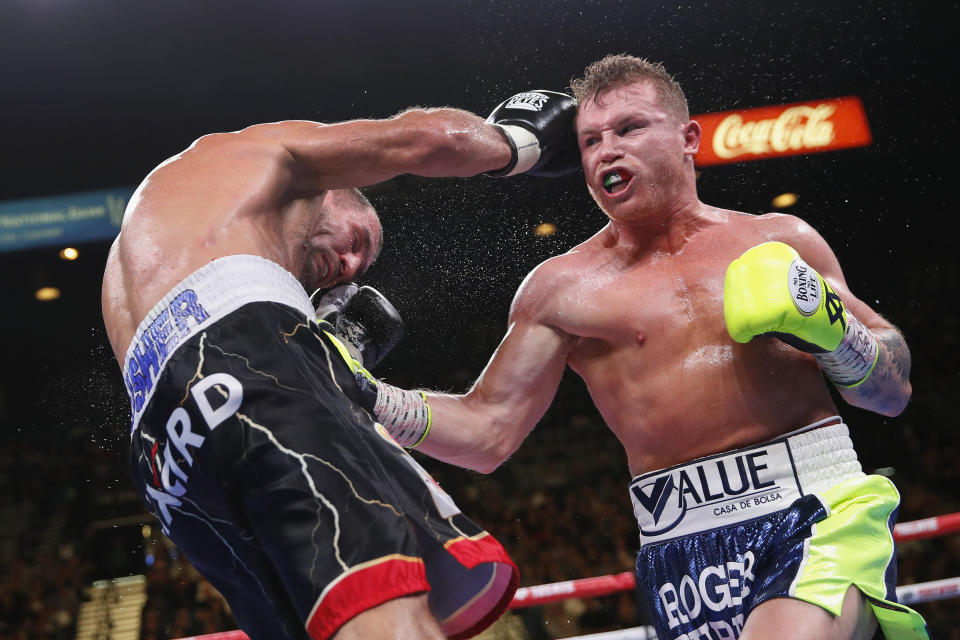Why Canelo Alvarez’s release from Golden Boy makes sense
In many ways, Golden Boy Promotions’ decision Friday to release Canelo Alvarez from his contract would be like the Lakers waiving LeBron James. On the surface, it’s incomprehensible.
Alvarez is the biggest star in boxing and generates pay-per-view numbers that no one else can.
But dig beyond the surface a bit and the move makes sense for all sides.
In two years, the deal to fight exclusively on DAZN — which was hailed upon its signing on Oct. 16, 2018, as the richest in sports — became untenable.
There weren’t enough quality opponents for it to make sense for DAZN to pony up $40 million a fight — $35 million a fight to Alvarez and $5 million per fight to Golden Boy. And Golden Boy was finding it increasingly difficult to work with Alvarez.
When the pandemic hit in the spring, it only made it that much more difficult to pay the freight. DAZN asked Alvarez to take roughly half of what he was owed, and Alvarez agreed if it were paid to him at the end of the deal. But nobody wanted to be on the hook for that kind of money because of the economy and the uncertain state of boxing.
Furthermore, the relationship between Alvarez and Golden Boy CEO Oscar De La Hoya had soured to the point where when they sat next to each other last year at a news conference, not only did they not speak, they did not even look at each other.
Alvarez filed suit against Golden Boy and DAZN in September. On Friday, the suit was settled and ended up, sources said, with Golden Boy getting no money to walk away from the eight figures remaining on Alvarez’s contract.

Golden Boy executives weren’t speaking publicly, but De La Hoya released a statement that read, “The lawsuit was resolved to everyone’s satisfaction, and we wish Canelo the best going forward.”
Golden Boy noted in its statement that it has fighters like Ryan Garcia, Jaime Munguia and Vergil Ortiz, and said it would continue to promote its fights on DAZN. But Garcia is managed and trained by Eddy Reynoso, who serves in those roles for Alvarez, and Garcia has openly feuded with De La Hoya.
It’s hard to imagine Golden Boy coming out of this settlement looking good.
It’s a body blow for DAZN, too, even though it removes a financial obligation that had quickly become a millstone.
DAZN has done precious few boxing cards since the pandemic, and while it is slowly beginning to be more active, it doesn’t have a guy like Alvarez who will be able to drive subscriptions.
It is also stuck with the bloated contract of Gennadiy Golovkin, who earns $7.5 million in cash and $7.5 million in equity for each fight. Without Alvarez and with both Charlo brothers fighting for the Premier Boxing Champions, there are no notable opponents for Golovkin at DAZN.
But it’s going to pay him an astronomical amount to fight second-tier opposition. That isn’t going to end well.
DAZN will have a big event whenever unified heavyweight champion Anthony Joshua fights, but Joshua’s star in the U.S. dimmed after his stunning 2019 loss to Andy Ruiz. Even though he won the rematch decisively, it was hardly dynamic and didn’t endear him to the American fan base.
So DAZN is going to find rough sledding persuading customers to subscribe, or keeping existing subscriptions.
It has a fight featuring promising lightweight Devin Haney, who on Saturday meets 2004 Olympic gold medalist Yuriorkis Gamboa. But it’s little more than a showcase bout for Haney, who holds the WBC title but still hasn’t fought a highly regarded, prime opponent.
DAZN could have a Haney-Garcia fight down the line and that could be attractive, but the other key players at lightweight — Teofimo Lopez, Vasiliy Lomachenko and Gervonta Davis — are with either Top Rank or the PBC.
DAZN isn’t doomed, but it hasn’t masterfully made its way through the landscape in the first two-plus years of its U.S. existence. It recently expanded worldwide and it would shock no one if DAZN turned its attention toward other countries and away from the U.S.
Even Alvarez took a few shots in this. He walked away from a deal that had eight fights and $280 million left. Given the state of the business, it’s hard to imagine he’ll be able to recoup that kind of money.
The best bet would be for him to fight for the PBC, where he could appear on Fox and Showtime pay-per-view shows. But he’d probably have to take a much lesser guarantee and then hope to make it up on upside.
Pay-per-views have not been selling well since the pandemic began, and it’s probably going to be more than a year, if not two years, before the market may begin to recover
Alvarez, though, as a professional athlete, doesn’t have the benefit of time. Time is of the essence for all pro athletes, whose careers have a defined and short shelf lives.
His best bet is probably to sign short-term deals with promoters to maintain maximum flexibility.
It’s big news whenever the biggest name in a given sport hits the free market.
But in boxing, things aren’t always what they seem, and never was that more evident than the alliance between Alvarez, Golden Boy and DAZN, which fell apart only 20 percent of the way into the supposed richest deal ever.
More from Yahoo Sports:

